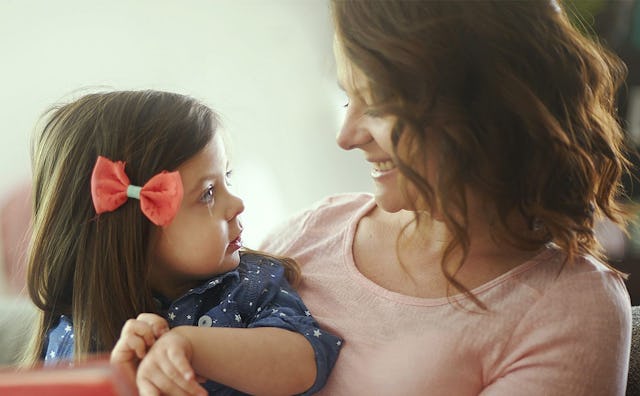How My Daughter Has Made Sense of Her Father's Death

Once a month, I receive a glossy parenting magazine in the mail. It has recipes, reviews of toys and books, and usually lots of “here’s how to balance your life and not totally screw up your kids” advice. It’s shiny and bright and pretty.
In the back of said magazine, there is a section of kids’ bloopers. They include funny things that children say about siblings, boogers and boobs among other topics, and little snippets of hilarity that make you think, gosh darn if kids don’t say the funniest things. I read them and smile, and then I think of all of the unscripted, jaw-dropping things I’ve heard my daughter say over the last 18 months.
Like the time she was barely 3 and I brought her in to say goodbye to her daddy, whose long battle with cancer had ended 10 minutes prior. She asked me why I was crying and why I was sad. I explained that I was sad because Daddy had died. She looked me right in the eyes and said, “Some people die,” then proceeded to give her daddy one last hug and kiss. Everyone in the room burst into combined laughter and tears, grateful for the brief respite of comic relief.
Then there was the time six months after his death when she put both her hands on my belly and asked me, “Why can’t you grow a baby in there like all the other moms?” Her daddy and I had tried for a second child, even attempting a mini-IVF treatment after he started chemo, but our second child never materialized. Numerous moms and staff at her preschool were expecting at the time, and for months she wanted to know why we couldn’t have a baby, too, not having any way of knowing how much it eviscerated me every time she asked.
Or the time I was trying to explain something and, not thinking, started a sentence, “Well, sometimes mommies and daddies …” and she reached out and put her hand on my arm and said, “but, Mama, we don’t have a daddy anymore.” This was followed closely by the time she asked me if we could buy a daddy for Christmas. When I explained to her that it didn’t work that way, that you couldn’t buy a daddy, she imploringly asked me if we could borrow one.
In a few weeks, her preschool is hosting an end-of-year celebration. When her teacher told the class about the upcoming event and how everyone’s mommy and daddy could attend, my daughter felt compelled to speak up and say, “My daddy died, so he’s not going to be able to make it.”
I have a dear friend whose husband died a little less than three years before mine. We’re in the “Young With Kids, Widowed By Stupid Cancer” club, and while we’re so grateful to have each other, we strongly recommend against membership. Her youngest and my daughter were almost exactly the same age when their daddies died, and she assures me that it gets no better as the years wear on. That her kids still say things in their beautiful, innocent, bewildering way that make her grateful for sunglasses or driving or anything else that might hide her face from them during the sudden sucker-punch to the heart.
Because that’s what it is: a sucker-punch to the heart. A mainlining of the grief you thought you had worked through, moved through, but it was apparently just hanging out under the surface like a dormant disease waiting to drop-kick you in the most vulnerable of places.
So, I read the glossy parenting magazines and indulge in the fantasy for a little while. I daydream about my daughter saying something funny about a sibling, shouting some embarrassing thing in public, or misusing a word in a way that’s only amusing to adults. All that said, I also appreciate that she tells the truth, that she says it like it is, and that I’ve done my best not to discourage her from expressing that truth.
Our life is not like a shiny magazine, and because of what we have been through together, the relationship I have with my daughter is so different from that of the other parents I know. While we’ve maintained our parent-child roles, we have also had to be closer and more cohesive to survive.
In our concurrent grief, we have been a lopsided but determined team in a game that has no rules. We have been through hell and back by each other’s sides. In each other’s arms, we have lost our ability to function and then gained it back. We have screamed and thrown things and sobbed into each other’s hair. We have buoyed each other and found happiness again.
It’s been a rough road, certainly, but we’re strong and willful. I embrace her for everything that she is, and everything that she will someday be, and she does the same for me.
This article was originally published on